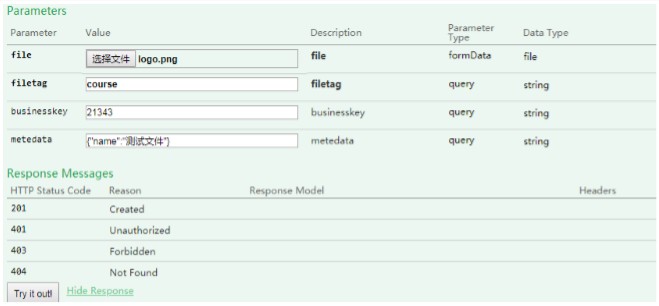1.1.3 API interface 1.1.3.1 model class
The file information of the system (information of small files such as pictures and documents) is stored in mongodb, and the model class of file information is below.
1) the model is as follows:
[mw_shl_code=applescript,true]
file‐size‐threshold: 0
Temporary directory of uploaded files
location:
Maximum supported file size
max‐file‐size: 1MB # Maximum support request size
max‐request‐size: 30MB xuecheng: fastdfs:
connect_timeout_in_seconds: 5
network_timeout_in_seconds: 30
charset: UTF‐8
tracker_servers: 192.168.101.64:22122
@Data @ToString @Document(collection = "filesystem") public class FileSystem {
@Id
private String fileId;
//File request path
private String filePath;
//file size
private long fileSize;
//File name
private String fileName;
//file type
private String fileType;
//image width
private int fileWidth;
//Picture height
private int fileHeight;
//User id, used for authorizing temporary use
private String userId;
//Business key
private String businesskey;
//Business Tags
private String filetag;
//File meta information
private Map metadata;
}
[/mw_shl_code]Explain:
"leId: the file ID returned by fastDFS. "lePath": request fastDFS to browse file URL. "Let tag": File tag. Since the file system service is a public service, the file system service assigns a file tag to the subsystem using the file system service to identify which system this file comes from.
businesskey: a business identification field provided by file system service for other subsystems. Each subsystem uses it according to its own needs. For example, course management stores course id in this field to identify which course the picture belongs to. metadata: meta information about the file.
2) collection creates the database XC ﹣ fs (file system database) in mongodb, and creates the collection fi lesystem.

1.1.3.2 Api interface
Under the API project, create the com.xuecheng.api.u lesystem package,
[mw_shl_code=applescript,true]
public interface FileSystemControllerApi {
/**
* Upload files
* @param multipartFile file
* @param filetag file label
* @param businesskey Business key
* @param metedata Meta information, json format
* @return
*/
public UploadFileResult upload(MultipartFile multipartFile,
String filetag,
String businesskey,
String metadata); }[/mw_shl_code]1.1.2.3 Dao
The file information is stored in the database, mainly the file path in the file system.
[mw_shl_code=applescript,true]public interface FileSystemRepository extends MongoRepository<FileSystem,String> { }[/mw_shl_code]
1.1.2.4 Service
[mw_shl_code=applescript,true]@Service public class FileSystemService { private static final Logger LOGGER = LoggerFactory.getLogger(FileSystemService.class);
@Value("${xuecheng.fastdfs.tracker_servers}")
String tracker_servers;
@Value("${xuecheng.fastdfs.connect_timeout_in_seconds}")
int connect_timeout_in_seconds;
@Value("${xuecheng.fastdfs.network_timeout_in_seconds}")
int network_timeout_in_seconds;
@Value("${xuecheng.fastdfs.charset}")
String charset;
@Autowired
FileSystemRepository fileSystemRepository;
//Load the configuration of fdfs
private void initFdfsConfig(){
try {
ClientGlobal.initByTrackers(tracker_servers);
ClientGlobal.setG_connect_timeout(connect_timeout_in_seconds);
ClientGlobal.setG_network_timeout(network_timeout_in_seconds);
ClientGlobal.setG_charset(charset);
} catch (Exception e) {
e.printStackTrace();
//Error initializing file system
ExceptionCast.cast(FileSystemCode.FS_INITFDFSERROR);
}
}
//Upload files
public UploadFileResult upload(MultipartFile file,
String filetag,
String businesskey,
String metadata){
if(file == null){
ExceptionCast.cast(FileSystemCode.FS_UPLOADFILE_FILEISNULL);
}
//Upload file to FDFS [/ MW ﹣ SHL ﹣ code]
[mw_shl_code=applescript,true]String fileId = fdfs_upload(file);
//Create file information object
FileSystem fileSystem = new FileSystem();
//File id
fileSystem.setFileId(fileId);
//The path of the file in the file system
fileSystem.setFilePath(fileId);
//Business identification
fileSystem.setBusinesskey(businesskey);
//Label
fileSystem.setFiletag(filetag);
//metadata
if(StringUtils.isNotEmpty(metadata)){
try {
Map map = JSON.parseObject(metadata, Map.class);
fileSystem.setMetadata(map);
} catch (Exception e) {
e.printStackTrace();
}
}
//Name
fileSystem.setFileName(file.getOriginalFilename());
//Size
fileSystem.setFileSize(file.getSize());
//file type
fileSystem.setFileType(file.getContentType());
fileSystemRepository.save(fileSystem);
return new UploadFileResult(CommonCode.SUCCESS,fileSystem);
}
//Upload the file to fdfs and return the file ID public string fdfs "upload (multipartfile file){
try {
//Load the configuration of fdfs
initFdfsConfig();
//Create tracker client
TrackerClient trackerClient = new TrackerClient();
//Get trackerServer
TrackerServer trackerServer = trackerClient.getConnection();
//Get storage
StorageServer storeStorage = trackerClient.getStoreStorage(trackerServer);
//Create storage client
StorageClient1 storageClient1 = new StorageClient1(trackerServer,storeStorage);
//Upload files
//File byte
byte[] bytes = file.getBytes();
//File original name
String originalFilename = file.getOriginalFilename();
//File extension
String extName = originalFilename.substring(originalFilename.lastIndexOf(".") + 1);
//File id
String file1 = storageClient1.upload_file1(bytes, extName, null);
[/mw_shl_code]
[mw_shl_code=applescript,true]
return file1;
} catch (Exception e) {
e.printStackTrace();
}
return null;
} }[/mw_shl_code]
1.1.2.5 Controller
[mw_shl_code=applescript,true]@RestController @RequestMapping("/filesystem") public class FileSystemController implements FileSystemControllerApi { @Autowired
FileSystemService fileSystemService;
@Override
@PostMapping("/upload")
public UploadFileResult upload(@RequestParam("file") MultipartFile file,
@RequestParam(value = "filetag", required = true) String filetag, @RequestParam(value = "businesskey", required = false) String businesskey, @RequestParam(value = "metedata", required = false) String metadata) { return fileSystemService.upload(file,filetag,businesskey,metadata);
} }[/mw_shl_code]1.1.2.6 testing
Test with swagger UI or postman. The following figure shows the test interface using the swagger UI: